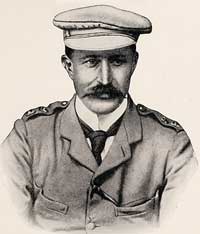Henry Jenner Scobell
| Sir Henry Jenner Scobell | |
|---|---|
 |
|
| Nickname(s) | Harry |
| Born |
January 2, 1859 Saint George, Hanover Square, England |
| Died | February 2, 1912 (aged 53) Rondebosch, Cape Province |
| Allegiance |
|
| Service/branch |
|
| Years of service | 1879 - 1912 |
| Rank | Major-General |
| Unit | Scots Greys |
| Commands held | OC 5th Royal Irish Lancers 2nd Dragoons (Royal Scots Greys) GOC, Cape of Good Hope District |
| Battles/wars | Battle of Groenkloof |
| Awards | KCVO, CB, Queen's Medal (six clasps), King's Medal (two clasps) |
| Relations | Harriet Mildred Willes-Johnston (wife) |
Major-General Sir Henry Jenner "Harry" Scobell, KCVO, CB (2 January 1859 – 1 February 1912) was a British military leader who served as the last officer in command of Cape Colony before the formation of the Union of South Africa.
Scobell was born in Hanover Square, he was the son of Col. Henry Sales Scobell & his wife Catherine Sarah Jenner Bedford. His maternal great grandfather was Edward Jenner. After attending Eton College, rather than attend Sandhurst, Scobell obtained a commission as a second lieutenant in the Worcester Militia in 1878. In 1879, he obtained a transfer from the militia, joining the 2nd Dragoons (RoyalScots Greys).
Over the next ten years, saw little active service, but Scobell achieved promotion to captain by 1886. In 1889, he was seconded from the Scots Greys to serve as the adjutant of the Royal Wiltshire Yeomanry. In 1896, Scobell would be promoted to major in the Scots Greys.
In 1899, Scobell deployed with his regiment to South Africa to fight in the Boer War. At the start of the war, Major Scobell commanded C Squadron. Initially, the regiment patrolled the area between the Orange and Modder rivers. With the start of Lord Roberts' offensive against the Boer Republics, Scobell saw his first action at the Battle of Paardeberg before participating in the relief of Kimberly.
Following the battle of Paarderberg, Scobell's squadron captured a strategic hill east of Bloemfontein. With 65 men, Scobell rode 35 miles, forcing his way past the Boer commandos defending the rail line in order seize the heights. Through the night, Scobbel's men held the hill despite being outnumbered by Boer commandos.
Scobell's squadron was left at Utival (also known as Zilikats Nek). There they were eventually joined by five companies from the 2nd battalion, the Lincolnshire Regiment, with a section of guns from O Battery, RHA. While Scobell had kept a strong picket line out to watch for Boer commandos, this was changed when he was superseded as the commander of the garrison. With the Scots Greys came under the command of an infantry colonel, the picket outposts were decreased. This allowed when the outpost was attacked by a force of Boer commandos on 10 July 1900. Most of the squadron was captured during the disaster which ensued. The defeat allowed the Boers to hold Zilikats Nek. Scobell was able to escape with part of his command, having to shoot their way through the Boer commandos
...
Wikipedia
